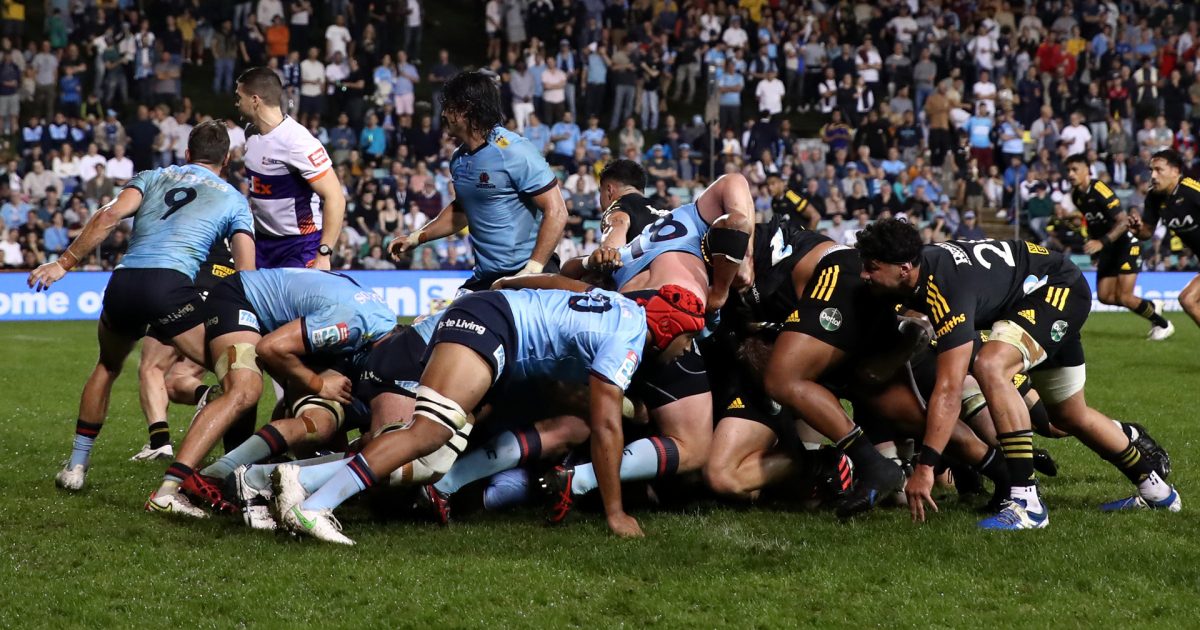'You never really want to do that': Gibbes reflects on Hurricanes' set-piece woes

Just 34 minutes into the Hurricanes’ match with the Waratahs at Leichhardt Oval on the weekend, the coaches made the somewhat unprecedented decision to replace their entire front row.
Xavier Numia, Asafo Aumua and Tyrel Lomax had been bashed, beaten and bruised by their opposites at the set-piece, conceding four penalties in the opening half and accelerating backwards at a rate of knots, even on their own feed.
Angus Bell, in particular, seemed to be working over All Blacks tighthead Lomax and it completely stymied any attempts from the Hurricanes to build a platform from which to attack. Somewhat unsurprisingly, they were well behind on the scoreboard, down 15-nil without having ever really fired a shot.
Shortly before halftime clicked over, the Hurricanes coaches made the decision to rotate out their starting trio and bring in Tevita Mafileo, Dane Coles and Owen Franks – and the impact was immediate.
In the first scrum following the front-row swap, Franks earned a penalty against Bell – and that was the way the night continued.
View this post on Instagram
With the Hurricanes finally having the upper hand at the set-piece, they clawed their way back into the match, scoring three tries and two penalties in the second stanza and limiting the Waratahs to just three further points.
The game ended 22-18 in the visiting sides’ favour and it was the decision to sub on Mafileo, Coles and Franks in the first half that can easily be pinpointed as the turning point of the match. It wasn’t a decision that was made lightly, according to forwards coach Chris Gibbes, but one was necessary to turn the tide in the Hurricanes’ favour.
“A hell of a tough decision that and you never really want to do that in any game,” he told media on Tuesday. “Those three boys have done a hell of a job for us leading into that game.
“It’s a combination of a few things we got wrong and then we just got a little bit individual. From a team perspective, we needed to make that decision around we can try and let the boys work it out but potentially get a yellow card at the scrum – which was probably coming next – or we make the change and use the depth we’ve got in the squad and on the bench. That’s the way we went and it worked out [well] that way.
“You never want to see the boys come off the field like they did and [have] to make those subs so early but at the end of the day, it’s a team and that’s what comes first.”
Gibbes noted that while loosehead prop Numia had at times looked to get the upper hand over his opposite, Archer Holz, the three front-rowers simply weren’t gelling well enough as a unit.
“[Numia] did put heat on but it’s a collective, that front row,” Gibbes said. “If one guy’s overworking and the other guys aren’t quite getting it right and not nailing the plan then it doesn’t really matter because it’s still going to wheel and angle.
“Again, it’s just the learnings we’ve had from that this morning and trying to find solutions to the problems on the field has been a key focus.”
The game against the Waratahs marked the third time that the trio of Numia, Aumua and Lomax have started together this season and it was the first instance of them really struggling as a unit.
All Blacks head coach Ian Foster will have taken note of the proceedings on Saturday evening with both Aumua and Lomax likely to earn selection in the national side later this year – but similar hiccups at test level could be disastrous for the men in black.
Foster has praised Lomax’s ability to adjust to the tactics of opposition looseheads in the past but the 26-year-old evidently struggled to do so while he was on the field against Wallabies prop Bell.
“He was pretty impressive off the bench, actually,” Foster said of Lomax’s performance against Argentina last year. “Tyrel is a good scrummager and I thought in the second half he came in and was able to apply some of the learnings we had about the different tactics that were occurring at scrum time that caused us to get penalised a couple of times. I was quite pleased with the way he learnt, adapted and adjusted to that.”
Franks, with seven years of seniority over Lomax, however, is a wily operator of his own and has faced international opposition all over the field throughout his extended career. Evidently, Bell’s work at scrum time was no match for Franks’ own mastery of the dark arts.


































Lomax is the 2020s version of Jamie McIntosh. All the physical goods ..but..